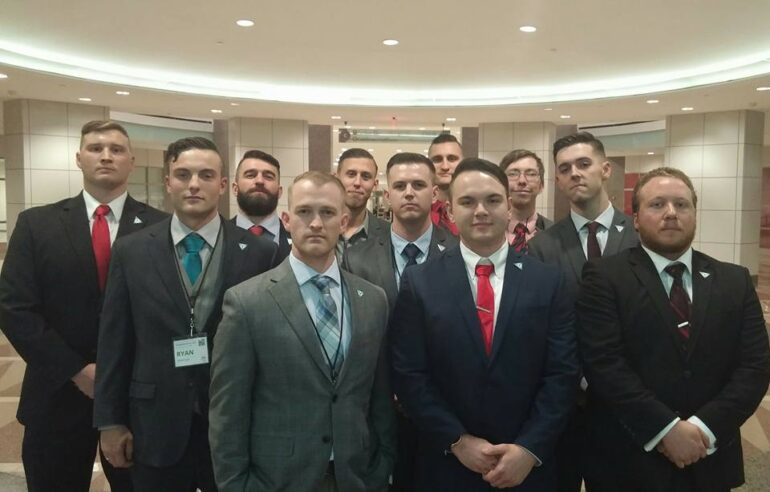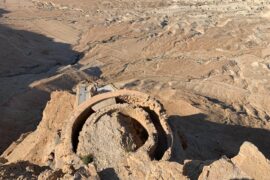As the quintessential enemy of our people, Amalek has garnered great attention in Jewish literature over the centuries. Especially in our current age, every perceived threat to Jews seems branded as a new incarnation of “Amalek,” from Nazis to the Iranian regime to Palestinian terrorism.
Carrying on the tradition of Jewish historiography, which seeks to understand the present in its relationship to the people, ideas, and struggles of the past, these polemics focus on the threat the Amalekites posed to Hebrew survival in the desert and their indiscriminate violence in order to understand recent anti-Jewish behavior against the backdrop of an ongoing cosmic struggle between Israel and Amalek.
Yet, these interpretations lack the analytical depth expressed by the sages of our historiographic tradition. While Amalek was a violent threat to Jewish survival, their historical significance goes far beyond the battle they waged against Israel in the desert.
First, Amalek (the man), founder of the nation, is listed in B’reishit 36:12 as a descendant of Esav, brother of our patriarch Yaakov, through his son Eliphaz and the concubine Timna.
Our sages (in Talmud Sanhedrin 99b) explain that Timna was the daughter of a great chieftain who became a concubine to Eliphaz out of a desire to join the family of Avraham, and turned to Esav only after she had been rejected by Avraham, Yitzḥak, and Yaakov. They assert that these rejections are the reason for Amalek’s enmity towards the children of Israel.
The unique threat of Amalek is not just an external enemy, but a manifestation of Israel’s failings and shortcomings. The Baal Shem Tov points out that Amalek and the word “suffek” (doubt) have the same gematria (numerical) value of 240 (as does the Hebrew word “dollar”), and that the root of Amalek’s power over Israel lies in our own self doubt.
This is borne out in the context of Amalek’s attack on Israel in the desert in Sh’mot 17:8. The preceding verse reads: “The place was named Massah and Meribah, because the Israelites quarreled and because they tried HaShem, saying, ‘Is HaShem present among us or not?’”
Amalek attacked Israel, and almost succeeded in wiping us out, due to our internal division and lack of emuna. This thread of doubt is recurrent throughout our sordid history with Amalek.
Shaul lost his kingdom for doubting the word of the prophet Shmuel regarding HaShem’s will that Amalek be utterly annihilated and that its property be destroyed. Had he maintained his emuna and followed through with killing King Agag rather than plunder the Amalekite city, Shaul would have brought his nation one step closer to redemption. But instead, his doubt allowed Amalek to survive as a constant threat.
This threat rose once again in the time of the Purim story, another period of great doubt. Despite the reconsecration of the Beit HaMikdash under Cyrus, the majority of Israel remained scattered across the Persian empire. Not only did they remain in exile, but many integrated into the cultural and economic elites of the empire, preferring the comfort of Persian aristocracy to a messianic return to Eretz Yisrael.
It is in this context of the majority of Israel taking the glory and power of HaShem for granted that Haman, a descendant of the Amalekite king Agag spared by Shaul, came close to annihilating the Jews throughout the 127 provinces of the Persian kingdom.
So, as has been the case throughout our history, Amalek persists as an enemy that threatens Israel in times of crises of faith, times of great doubt regarding our mission in the world and the power of HaShem. Amalek takes advantage of our self-made blinders, which cloud our vision, to ambush us from behind when we are weakest.
In the contemporary United States, Jews have reached new heights of internal conflict and doubt. The trauma of the Holocaust, the promise of assimilation, and the opportunity of renewed Hebrew sovereignty in our land have created a whirlwind of conflicting interests and attitudes among Jews in the US.
Yet, it is in these confusing times that Amalek has the greatest power over us.
Our obligation to bring justice and holiness into the world has, in too many instances, taken a back set to promoting Jewish security at any and all costs. The devastation of the Holocaust, following a long history of Jewish destruction and loss, has shaken Jews into an aggressive defensiveness, which might be a natural response to such horrors but could also get in the way of our national mission.
This aggressive mindset of defensiveness opens the door to a more insidious enemy that feeds on our fears and doubts. The fear of renewed persecution in the United States has led many to integrate into American culture, enjoying the benefits of wealth and power that come with it like our ancestors who remained in exile after the dedication of the second Temple. Some have become so deeply embedded in American society that they fail to see Amalek once again rearing its ugly head.
The American far right has become a source of great confusion, discord, and doubt for US Jews. It is an alliance of ultra-conservative Christians, hellbent on returning Jews to the land of Israel and alt-right white nationalists blaming Jews for the decline of their civilization yet content with shipping us all off to Israel while adapting what they see as Israel’s ethno-national identity to define a white America.
For Jews in the US and in Israel, this message of support for a Jewish Israel has broad appeal. Yet, as has always been the case with Amalek, a more insidious threat lies beneath. In addition to their anti-Semitism, be it religious or racial, the American far-right muddles our mission of bringing authentic Jewish conceptions of justice to the world by proclaiming a mythical “Judeo-Christian” moral system as the basis of Western civilization’s superiority.
The fear of past destructions, the appeal of Washington’s support for Israel, and the hope of a maintained Jewish presence in the US have led far too many Jews into doubt. They have turned a blind eye to those the far right threatens, and it is this blindness that Amalek inevitably tries to exploit.
In order to truly succeed in bringing about redemption, Jews around the world must once and for all destroy Amalek and the internal division it creates. The greater safety and cohesion Israel will enjoy in a post-Amalek reality will enable us to spread HaShem’s message to the nations of the world from a position of confidence and unity, rather than doubt and division.
Only then can there be a final tikkun, a restitution for the wrong done to Timna, when we invite all peoples to share in our mission of bringing HaShem’s justice and light into the world.





